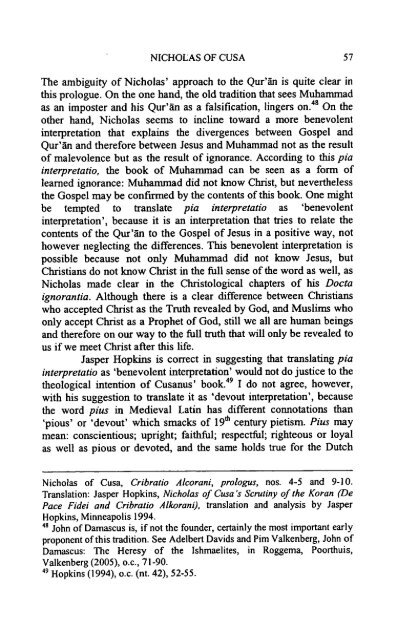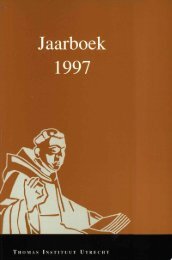Jaarboek Thomas Instituut 2006 - Thomas Instituut te Utrecht
Jaarboek Thomas Instituut 2006 - Thomas Instituut te Utrecht
Jaarboek Thomas Instituut 2006 - Thomas Instituut te Utrecht
You also want an ePaper? Increase the reach of your titles
YUMPU automatically turns print PDFs into web optimized ePapers that Google loves.
NICHOLAS OF CUSA 57<br />
The ambiguity of Nicholas' approach to the Qur'än is qui<strong>te</strong> clear in<br />
this prologue. On the one hand, the old tradition that sees Muhammad<br />
as an impos<strong>te</strong>r and his Qur'än as a falsification, lingers on.48 On the<br />
other hand, Nicholas seems to incline toward a more benevolent<br />
in<strong>te</strong>rpretation that explains the divergences between Gospel and<br />
Qur'än and therefore between Jesus and Muhammad not as the result<br />
of malevolence but as the result of ignorance. According to this pia<br />
in<strong>te</strong>rpretatio, the book of Muhammad can be seen as a form of<br />
learned ignorance: Muhammad did not know Christ, but nevertheless<br />
the Gospel may be confirmed by the con<strong>te</strong>nts of this book. One might<br />
be <strong>te</strong>mp<strong>te</strong>d to transla<strong>te</strong> pia in<strong>te</strong>rpretatio as 'benevolent<br />
in<strong>te</strong>rpretation', because it is an in<strong>te</strong>rpretation that tries to rela<strong>te</strong> the<br />
con<strong>te</strong>nts of the Qur'än to the Gospel of Jesus in a positive way, not<br />
however neglecting the differences. This benevolent in<strong>te</strong>rpretation is<br />
possible because not only Muhammad did not know Jesus, but<br />
Christians do not know Christ in the full sense of the word as well, as<br />
Nicholas made clear in the Christological chap<strong>te</strong>rs of his Docta<br />
ignorantia. Although there is a clear difference between Christians<br />
who accep<strong>te</strong>d Christ as the Truth revealed by God, and Muslims who<br />
only accept Christ as a Prophet of God, still we all are human beings<br />
and therefore on our way to the full truth that will only be revealed to<br />
us if we meet Christ af<strong>te</strong>r this life.<br />
Jasper Hopkins is correct in suggesting that translating pia<br />
in<strong>te</strong>rpretatio as 'benevolent in<strong>te</strong>rpretation' would not do justice to the<br />
theological in<strong>te</strong>ntion of Cusanus' book." I do not agree, however,<br />
with his suggestion to transla<strong>te</strong> it as 'devout in<strong>te</strong>rpretation', because<br />
the word pius in Medieval Latin has different connotations than<br />
'pious' or 'devout' which smacks of 19th century pietism. Pius may<br />
mean: conscientious; upright; faithful; respectful; righ<strong>te</strong>ous or loyal<br />
as well as pious or devo<strong>te</strong>d, and the same holds true for the Dutch<br />
Nicholas of Cusa, Cribratio Alcorani, protogus. nos. 4-5 and 9-10.<br />
Translation: Jasper Hopkins, Nicho/as of Cusa 's Scrutiny of the Koran (De<br />
Pace Fidei and Cribratio A/korani), translation and analysis by Jasper<br />
Hopkins, Minneapolis 1994.<br />
48 John of Damascus is, if not the founder, certainly the most important early<br />
proponent of this tradition. See Adelbert Davids and Pim Valkenberg, John of<br />
Damascus: The Heresy of the Ishmaeli<strong>te</strong>s, in Roggema, Poorthuis,<br />
Valkenberg (2005), o.c., 71-90.<br />
49 Hopkins (1994), o.c. (nt. 42), 52-55.








